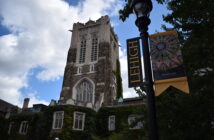During my time at Lehigh, I have often heard about and participated in conversations regarding the perception of Lehigh from prospective students applying in high school. Of the things discussed, a common theme seemed to occur: Greek life.
Many students, including myself, expressed that, when coming to Lehigh, they had no idea how big Greek life was in terms of the social scene.
After numerous conversations, I began to wonder why this seemed to be the case. With this in mind, I went into the field to find out how Lehigh portrays the Greek system to prospective students.
First, I popped into a prospective student information session in the admissions building. The room was about a third of the way full, and the presentation seemed pretty impressive. The Lehigh representative was quite enthusiastic and began telling all sorts of cool information and statistics about the school.
As I listened, I was anxiously waiting for the speaker to broach the subject of Greek life. Finally, the presentation shifted to extracurricular activities, and it was said that Lehigh boasts over 150 organizations for students to join.
These included intramural sports, the Simpsons club, the Quidditch club, the Mustard and Cheese Drama Society, etc. At the end of the list, Greek life was briefly discussed. It was said 30 to 40 percent of students join Greek chapters.
This was the first inkling that my suspicions may have been correct about how Greek life is presented to prospective students. After all, how could only a quick mention of Greek life be sufficient when it seems to be utterly intertwined with social life here?
But still, I waited. Perhaps more information would later be presented on the matter.
That was not the case. The info session ended, and the audience was asked if it had any questions.
Yes, indeed, I had a question.
I asked the speaker to talk a little bit more about Greek life at Lehigh. The speaker readily appeased me and started to say a bit more.
It was said that Greek life was not the end-all, that first-year students are recruited in the spring and that one is “definitely not shut out of activities if you’re not Greek.”
I would bet that many students who have been turned away at off-campus parties would beg to differ.
This seemed a bit iffy to me, but I knew I still needed to dig deeper.
Next, I looked through the information packet that is handed out to prospective students. Within the six pamphlets contained inside the welcome bags, Greek life is only mentioned once: A pamphlet states, “BE A PART OF THE ACTION: At Lehigh, you’ll find hundreds of opportunities to enrich your life outside the classroom. Lehigh offers:
- More than 150 clubs and organizations
- 40-plus intramural and club sports
- 31 nationally recognized fraternities and sororities.”
Again, to me, this seemed to be an under-representation of how influential Greek life is at Lehigh. The same held true when looking through Lehigh’s admissions website: there’s virtually no mention of Greek life. I know many may say that Greek life is not the only option and that there are, indeed, many other things to do socially. While this is true to an extent, it is of my opinion that Greek life is the predominant social outlet.
Yet, I still needed to look further. So, I spoke with a Lehigh undergraduate tour guide, who wished to remain anonymous.
“We all have to mention it,” the tour guide said. “Basically, what we talk about is just the different fraternities and sororities on campus and the numbers of both. I think it’s like 19 fraternities, nine sororities, something like that.
“But basically, we just have to say it’s not the only social outlet on campus, even though it’s pretty dominant. We also talk about other clubs that you can get involved in, but we truly do try to shy away from talking about Greek life too much just because it is so present, and that may cause some people not to apply to Lehigh.”
I asked whether this telling of Greek life was something that had simply been a cultural tactic among tour guides that had been passed down over time – or that, perhaps, tour guides are being influenced to downplay Greek life.
“I think it’s people influencing us, like the admission directors,” the tour guide said. “They want as many high-quality applicants as they can get, so they don’t just want one certain aspect of the school to kind of shy people away from applying.”
The tour guide also made sure to clarify that it isn’t as if there should be no mention of Greek life at all.
“It’s not like they don’t want us to talk about Greek life – they want us to talk about it carefully, almost, and not let anything slip up on the tour,” the guide said.
Finally, the guide said that during each tour guide training session, tough questions and answers are practiced, including questions pertaining to Greek life.
I can see the dilemma that admission directors face. They want a diverse student body that is interested in a multitude of things, and perhaps includes students who don’t want to be involved in Greek life. How could one ever hope to change such a culture unless they gain students who are not necessarily looking to join Greek life?
My argument is neither whether our culture is good or bad, nor what it should be. My argument is, rather, that prospective students deserve full disclosure. The onus is on admissions to figure out how to attract a diverse student population while presenting the realities of campus life.
With all this in mind, it seems that my and others’ suspicions were correct. It looks as though Lehigh admissions, indeed, tries to downplay the full nature of Greek life’s influence on social life at Lehigh.
Such seems to be an unfortunate truth. When a prospective student is weighing their options on what college to attend, the social scene can be a vital aspect. With this in mind, I believe that it is unfair to students who were unaware to the realities of Lehigh’s social scene and, in some cases, have an unhappy experience.
However, no need to fret, for the solution to this problem is quite simple. Instead of tiptoeing around the elephant in the room, we can be forthright about our social culture. I believe this will draw more students who are looking for this type of social environment, mitigate those who may otherwise experience buyer’s remorse and perhaps lure those who wish to change the culture.






Comment policy
Comments posted to The Brown and White website are reviewed by a moderator before being approved. Incendiary speech or harassing language, including comments targeted at individuals, may be deemed unacceptable and not published. Spam and other soliciting will also be declined.
The Brown and White also reserves the right to not publish entirely anonymous comments.
1 Comment
I noticed this personally while attending a high school open house here with my son. One of the presentations was a panel of current students who answered questions about their experiences at Lehigh. None of the panel members participated in Greek life and had difficulty answering prospective students’ questions. Knowing how prevalent Greek life is here, I found it odd that there was no representative included on the panel.